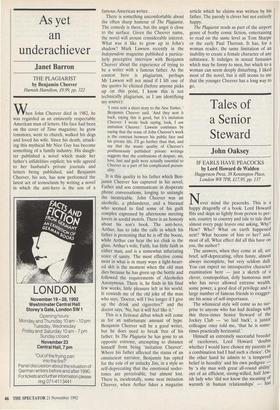As yet an underachiever
Janet Barron
THE PLAGIARIST by Benjamin Cheever Hamish Hamilton, £9.99, pp. 322 Wen John Cheever died in 1982, he was regarded as an eminently respectable American man of letters. His face had been on the cover of Time magazine; he grew tomatoes, went to church, walked his dogs and loved his wife. Since his death, attack- ing this mythical Mr Nice Guy has become something of a family industry. His daugh- ter published a novel which made her father's infidelities explicit; his wife agreed to her husband's private journals and letters being published, and Benjamin Cheever, his son, has now performed the latest act of iconoclasm by writing a novel in which the anti-hero is the son of a
famous American writer.
There is something uncomfortable about the often sharp humour of The Plagiarist. The comedy is there, but the angst is close to the surface. Given the Cheever name, the novel will arouse considerable interest. What was it like to grow up in John's shadow? Mark Lawson recently in the Independent magazine published a particu- larly perceptive interview with Benjamin Cheever about the experience of trying to be a writer with a famous father. As the context here is plagiarism, perhaps Mr Lawson will not mind if I lift one of the quotes he elicited (before anyone picks up on this point, I know this is not technically plagiarism, as I am identifying my source): '1 once sent a short story to the New Yorker,' Benjamin Cheever said. And they sent it back, saying this is good, but it's imitation Cheever: I wrote back saying, look, I am imitation Cheever.' Lawson continues by saying that the tease of John Cheever's work is the contrast between his public face and his private life. I'll go further than that, and say that the manic quality of Cheever's posthumously published private writings suggests that the confessions of despair, sin, love, lust and guilt were actually essential to Cheever as a part of his complicated person- ality.
It is this quality in his father which Ben- jamin Cheever has captured in his novel. Father and son communicate in desperate phone conversations, longing to untangle the inextricable. John Cheever was an alcoholic, a philanderer, and a bisexual who seemed to find some of his guilt complex expressed by afternoons meeting lovers in sordid motels. There is an honesty about his son's book. The anti-hero, Arthur, has to take the calls in which his father is protesting that he is off the booze, while Arthur can hear the ice clink in the glass. Arthur's wife, Faith, has little faith in either man, and is a somewhat infuriating voice of sanity. The most effective comic twist in what is in many ways a light-heart- ed skit is the moment when the old man dies because he has given up the bottle and followed the requirements of Alcoholics Anonymous. There is, he finds in his final few weeks, little pleasure left in his world. It reminds me of the old joke of the man who says, 'Doctor, will I live longer if I give up the drink and cigarettes?' and the doctor says, 'No, but it will feel like it.'
This is a fictional debut which will come in for an unfortunate amount of hype. Benjamin Cheever will be a good writer, but he does need to break free of his father. In The Plagiarist he has gone to an opposite extreme, attempting to distance himself from being 'imitation Cheever'. Where his father affected the status of an omniscient narrator, Benjamin has opted for the role of an unlucky Jim, in a style so self-deprecating that the emotional under- tones are perceivable, but almost lost. There is, incidentally, some neat imitation Cheever, when Arthur fakes a magazine
article which he claims was written by his father. The parody is clever but not entirely happy.
The Plagiarist reads as part of the airport genre of frothy comic fiction, entertaining to read on the same level as Tom Sharpe or the early Paul Theroux. It has, for a woman reader, the same limitation of an inability to create a female character of any substance. It indulges in sexual fantasies which may be funny to men, but which to a woman can seem deeply disturbing. I liked most of the novel, but it still seems to me that the younger Cheever has a long way to go.










































































 Previous page
Previous page